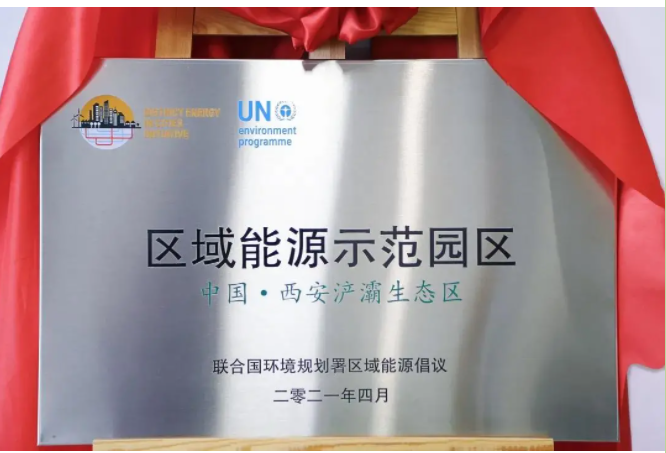District energy systems can not only contribute to greater sustainability through energy efficiency and renewable energy but also improve liveability and reduce air pollution.
To promote district energy solutions and sustainable city planning, the Chinese Ministry of Ecology and Environment this year launched a collection of green and low-carbon best-cases for districts. The cases were chosen based on recommendations by local organizations, expert review, and publicity.
On the list are three projects that have received support from UNEP DTU Partnership’s Copenhagen Centre on Energy Efficiency.
Xi’an Chanba Ecological Zone
Xi’an Chanba Ecological Zone is a “Regional Energy Demonstration Park” dominated by mid-deep geothermal energy and sewage waste heat, supplemented by solar energy, achieving multi-energy complementation and integration optimization. It promotes a replicable clean energy alternative technology path and is working towards a goal of “carbon peak and carbon neutrality”, as one of the national targets proposed by the Chinese government.
The Xi’an Chanba Ecological Zone was supported by the Copenhagen Centre on Energy Efficiency through the national project funded by the Global Environment Facility and implemented by the District Energy in Cities Initiative under United Nations Environment Program. The project aims to help selected cities in developing countries and emerging economies to transform into low-carbon and climate-adaptive societies. The district energy team in UDP has facilitated the municipality of Xi’an Chanba on capacity building, clean district heating project development, city-wide assessment and long-term planning.
Beijing Yizhuang Smart Park
The Beijing Yizhuang Smart Park is based on a low-carbon smart energy system combining wind power and distributed energy systems. It was recognized as China’s first renewable energy carbon neutral smart park, using 50% clean energy in 2020.
The park integrates renewable energy, smart micro-grid, smart water, green agriculture, sports health and other functions. It has a comprehensive energy supply through the deployment of 4.8MW decentralized wind power, 1.3MW distributed photovoltaic and vanadium flow, lithium batteries, super capacitors and other forms of energy storage, which can reliably and intelligently meet The demand of different loads in the park.
The Copenhagen Centre on Energy Efficiency, in collaboration with the German Energy Agency (dena), supported the Beijing Yizhuang Smart Park by conducting a cost-effectiveness analysis of potential low-carbon technologies in buildings, renewable energy and transportation, as well as other relevant issues for the smart park.
Dongjiang Lake Big Data Industrial Park
Dongjiang data centre industrial park hosts extra high efficient data centres using large-scale free cooling from a river nearby and heat recovery, in a so-called green “data valley”.
The industrial park uses nearby cold water resources to help the development of a cleaner big data industry. It covers an area of 4,500 acres and can accommodate 10 to 20 hype scale data centres, with 200,000 racks and 5 million servers.
Throughout the planning and project development stages, UNEP DTU Partnership has been working closely with the municipality in analysing the potential efficiency, economic and environmental benefits of different low-carbon technologies and nature-based solutions. Based on the especially high requirement for energy supply in data industries, the UNEP DTU Partnership experts also collaborated closely with local stakeholders to verify potential technologies to increase energy efficiency and security for these hyper scale data centres to further increase the overall regional energy efficiency.
A strategic partnership
On 1 July 2021, UNEP DTU Partnership and the Danish Energy Agency signed a strategic collaboration agreement, making it easier to exchange technical and regulatory knowledge and experiences with selected countries, including China and later on Ukraine.
Read more about the agreement and how it will ease the access to world-leading Danish know-how here.
The collaboration paves the way for a coordinated effort to promote green district heating solutions and at the same time strengthens Denmark’s current climate efforts in China.
The Danish Energy Agency collaborates with Chinese authorities on green energy transition, and UNEP DTU Partnership has for several years worked directly with Chinese cities to develop and implement concrete green solutions for district heating.
